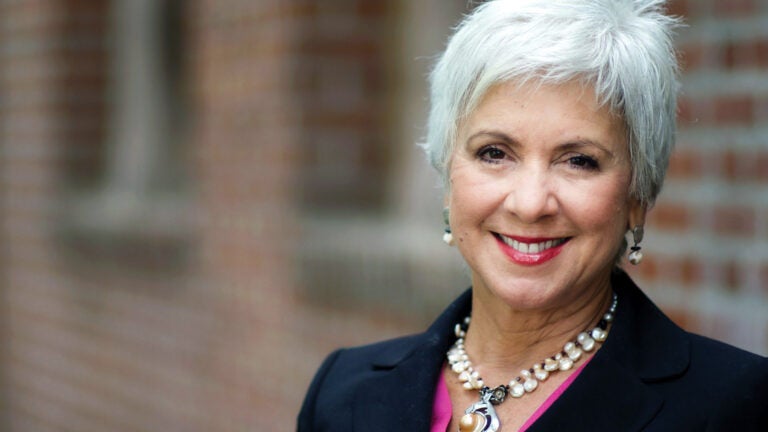
The story behind Hortensia Amaro informed her lifelong dedication to the underserved. (Photo/Dietmar Quistorf)
Hortensia Amaro, Academic Activist
Hortensia Amaro’s immigrant experience spurs a devotion to solving public health problems of the disenfranchised.
AT AGE 9, Hortensia Amaro fled Cuba for Miami with her two brothers and parents, who sought the freedom they lost after Fidel Castro’s revolution. But with immigration also came lessons in financial struggle and discrimination.
Upon relocating to Los Angeles, the formerly middle-income family moved into public housing. Several years later, as she entered seventh grade, Amaro was initially placed in classes for low-achieving students based on results of an IQ test given in fourth grade — when she spoke no English.
“I learned early on that you got punished in school if you spoke Spanish, and there was a lot of stigma around that, as well as being poor,” says Amaro, who joined the USC faculty in 2012. “When we saw television and advertising, the images didn’t reflect me, my family or our experience.”
But with support from her family and teachers, she turned her experiences into a positive. She would soon excel in school and blaze a research trail across psychology, public health and social work.
“It spurred my interest in understanding how individuals and families adapt to and function under difficult conditions, and a desire to improve their lives,” says Amaro, who also credits growing up during the civil rights and women’s rights movements of the 1960s and ’70s. Today, she brings a passion for science and “scholarly informed advocacy” to USC and families in need nationwide.
Roots in Reality
Amaro is USC’s first associate vice provost for community research initiatives and Dean’s Professor of Social Work and Preventive Medicine. For three decades she’s deeply contributed to knowledge about HIV prevention and treatment of substance abuse and trauma. She also studies health gaps among disenfranchised populations, including Latinas, African-American women and those reentering communities after incarceration.
Her career path began at the University of California, Los Angeles, where she pursued a doctorate in psychology. She studied barriers to alcoholism treatment among California women and factors affecting Mexican-American women’s reproductive attitudes and behaviors. When her mentors connected her with research under way at Boston University studying the impact of mothers’ drug use on newborns, she was intrigued. She moved east to join the research team.
Of the many women she interviewed, one study participant she met at a Boston hospital particularly influenced her career path: a heroin addict who had been engaged in sex work to pay for her habit and had gotten pregnant.
“She was waiting to hear if the baby she delivered was HIV-positive. At the time, there was severe stigma and discrimination toward people with HIV; people were dying from AIDS in huge numbers and she didn’t have much information or support. It made me think, I don’t want to spend my life producing research that just gets filed in a library.”
Then the work became personal. “Several weeks later, my younger brother was diagnosed with AIDS,” she says. “So, I decided to shift my research focus from describing problems to developing and testing prevention approaches.”
Finding Answers
Among her contributions is her discovery that female drug users are more likely to overcome addiction when their mental health and trauma issues, such as domestic violence, are treated at the same time. One such effort is the Boston Consortium Model, an integrated treatment approach she developed that’s recognized nationwide.
Amaro also developed numerous substance-abuse treatment programs in Boston. One of these, the Entre Familia (Spanish for “within the family”) residential treatment program for Latinas and their children, is housed in a city building named after her. While the program has helped thousands of Latino families, Amaro thinks back to one participant: a teachers’ aide whose addiction to heroin threatened her marriage and custody of her children.
Three years after the woman and her children went through the program, she had earned a teaching certificate and was working as a teacher, Amaro says. “Her children were happy, well-adjusted and doing well in school, and her marriage was on solid ground.”’
Commitment to Community
At USC, Amaro wants to take her community-based research to a new level, she says, building on the university’s “long history of engagement with the community and a perspective that its welfare and the community’s are intertwined.”
She plans to expand USC’s ability to bring together experts from different fields to conduct research in the community, including better assessing what communities need and using hard evidence to discover whether programs work so they can be broadly shared.
She’s especially interested in fostering research at USC that can improve conditions in poor neighborhoods, such as lack of economic opportunity, education quality and access to medical care, as well as family and community safety.
Her ultimate goal: “To have science serve society by developing tested solutions that help with real-life problems.”
If you have questions or comments on this article, write to us



